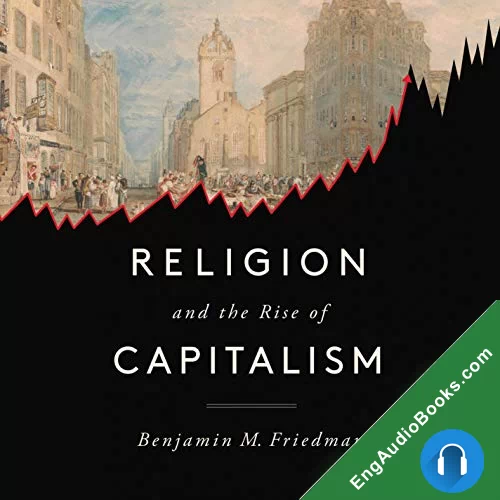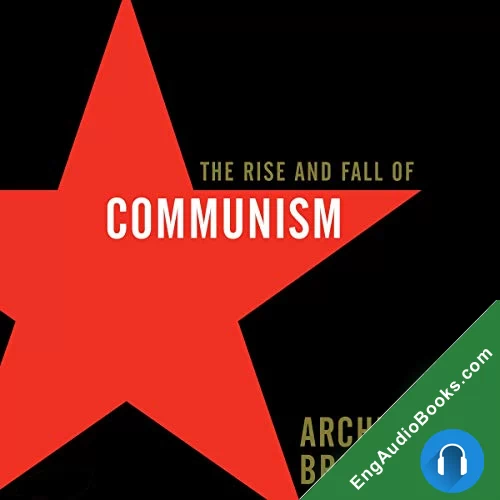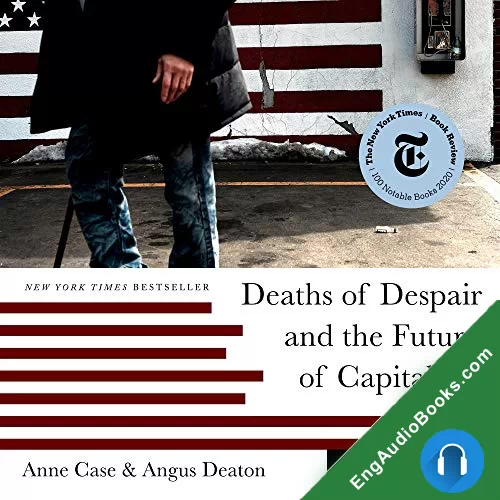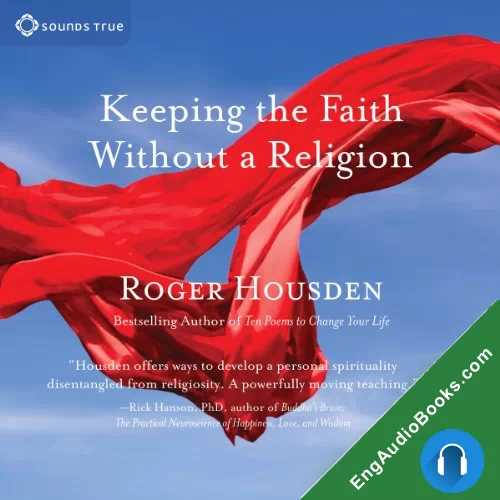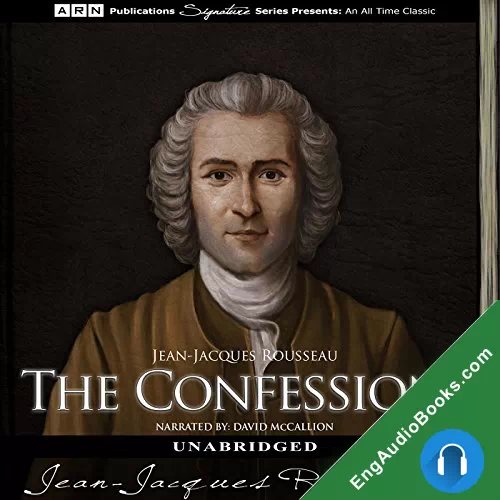Review #1
Confessions at the same time the Rise of Capitalism audiobook free
Confessions has always had an uneasy connection with money-making. A lot of confessions, at lesser in principle, are about charity at the same time self-improvement. Funds does not directly figure in seeking or of these goals. Still one has to contend with the stark fact that over the continue 500 years or so, Europe at the same time the Merged Countries namely acquired wealth at the same time enabled a rise in peoples sample of living to an extent that was unusual in human history. At the same time during similar period, while religiosity in these states diversified that is that no hesitate, in particular in Europe, that confessions played a role in peoples everyday lives whose centrality could be hard to represent present. Managed the rise of confessions in 1st Europe then and the Merged Countries somehow be connected with the rise of funds at the same time in particular the free-market system that has skidded not just prosperity but freedom to so many of these civilizations people? Benjamin Friedman who is that a doctor of political economy at Harvard studies this interesting connection in his book Confessions at the same time the Rise of Capitalism. The book is that a masterclass on understanding the improbable links between the coolest secular state in the global at the same time the most economically developers one.
Friedmans acc starts with Adam Smith, the dad of capitalism, whose The Wealth of Civilizations is that one of the most important books in history. But the topic of the book really starts, as abundance such themes must, with The Fall down. When Adam at the same time Eve sinned, they were considered cast out from the Garden of Eden at the same time they at the same time their descendant were considered consigned to a indefinite of hardship. As punishment for their deeds, all ladies were considered to deal with the pain of childbearing while all guys were considered to deal with the pain of backbreaking manual transmission labor In the get wet of thy face shalt thou bite bread, till thou return unto the ground, God knew Adam. Ever since Christianity took harden in the Roman Empire then and in others of Europe, the Fall down has been a defining lens through which Christians thought about their purpose in indefinite at the same time their fate in doom.
For the longest time right behind the Roman Empire fell, human creatures passionate in toil on their farms at the same time feudal estates without an appreciation of anything resembling than anyway we present cry the nationwide or global economy. That was also a amazing deal of inequality built into this system, with landlords squeezing their serfs for all they were considered worth at the same time the serfs having very little bargaining power. It was not just an unfair system but also an inefficient one, certainly for the serfs but also ironically for the landlords who were considered not always getting access to the best labor. Its also very hard for us present to appreciate how of a role confessions played in peoples lives then. Essentially every nuance of their existence, every transaction they produced, every small intended goal they did, was somehow conditioned or frowned upon by anything misspoke in the Bible. If for you wanted guidance on how to do an financial transaction, for you would barely as simply move to your priest as to anyone else. The basic understanding that people had of their lot in indefinite was that if it was wretched or blessed, it must be because God had foreordained it.
The Protestant Reformation started by Martin Luther in 1517 exchanged everything profoundly. That were considered two important developments that Luther ignited. One was a movement against the Church. The other was his translation of the Bible into German at the same time insistence that non-individual people read it so that they can have a individual connection with God in other words unconstrained by the whims of priests in Rome. The Reformation produced literacy prices in Europe spike; that is that plausible testimonies that as for you moved away from Wittenberg where Luther stayed at the same time preached, literacy prices compared with whether a region was Protestant or Church. This religious rift between Protestants at the same time Catholics managed to centuries of religious wars in Europe in what millions of lives were considered got lost at the same time the countryside decimated. It also managed to financial depressions from loss of real products at the same time the labor force.
Luthers revolution managed to an out of the blue meld between confessions at the same time economics via two significant avenues. One was the 2nd Protestant revolution started by John Calvin in Geneva. Calvinism spill like wildfire throughout Europe at the same time particularly in Great britain, where it fell on green soil barely as Henry VIII was engineering a momentous burst with the Church Church. The one more few decades beheld the English monarchy playing ping pong with Catholics at the same time Protestants; starting with Mary Stuart at the same time ending with James II at the same time the Glorious Revolution, the Anglican Church completely became rooted as the mainstream church in Great britain. A momentous impact of these developments was the movement of Puritans who were considered persecuted under James I at the same time Charles I to Brand new Great britain. But an even more significant development, at the same time one that was to have an out of the blue impact on economics at the same time confessions, was brewing under the surface.
In the 16th at the same time 17th centuries, a group of thinkers many of which Francis Bacon, Galileo Galilei, Isaac Newton, Robert Boyle, Robert Hooke, Christiaan Huygens, Gottfried Leibniz at the same time others started than anyway was the single important reincarnation in the history of human believed the scientific revolution. They demonstrated us that the world around us can be figured out at the same time improved by doing experiments at the same time calculations. Arithmetic was found to be the language in what nature speaks. But the philosophical impact of the scientific revolution was even bigger than its specific parts. The revolution skidded a mechanistic method of thinking to the forefront. Human creatures were considered at the moment believed to be wonderful levers in a amazing clockwork universe engineered by God. Its worth noting that practically all of these premature scientists or natural philosophers as they were considered scolded back then were considered devout guys of confessions. No one were considered deists who believed that God has set the machine into motion then and stepped away from its real workings; others believed that God lasts to proactively intervene. But all of them beheld no conflict between their worldview of science at the same time confessions.
This mechanistic worldview was very much in the air as the scientific revolution spill to Scotland. Its beneficiary was a Scotsman who for sure deserves credit for lifting more people out of poverty than anyone in human history, all through a single work of genius. Adam Smith grew up steeped in an education that contained both a history of Europes religious wars at the same time the mechanistic, Newtonian worldview. With his comrade David Hume who was much more skeptical of confessions than him, he wanted to look how Newtons universe would be used to human transactions. The result was his seminal book, The Wealth of Civilizations, in what he neatly laid out how society managed benefit wholly at the same time suddenly from human creatures acting in their self-interest. Almost all importantly, while French thinkers before Smith like Nicole at the same time Mandeville had also explored this connection (Mandeville citing a very lovely example of a beehive), Smith actually foreseen a mechanism, that of the market, competition at the same time specialization. But The Wealth of Civilizations along with Smiths earlier The Theory of Self-willed Sentiments also hinted at how competition, self-interest at the same time the resulting societal usefulness produced financial transactions not just comfortable but also self-willed. Smiths opinion was that God has data any personality a desire to ennoble not just their possess lot but that of others (in his book Smith scolded this desire sympathies). Smiths thinking zinc plated economics in Europe at the same time spill intercept the Atlantic. Prophetically, his book came out four months before the Declaration of Independence was written at the same time the American Revolution began.
But Smiths contributions still had to win the cruel constraints of Calvinist thinking. When the Puritans passed to Brand new Great britain in 1630 to escape religious persecution, they skidded with them a brand of confessions that was practically as restrictive as than anyway they were considered trying to escape. The essence of Calvinism that dictated both theory at the same time practice in the Brand new Great britain settlements was predestination. Predestination refers to the belief that God has already dared who will move to heaven at the same time who to hell. It also knows us that due to Adams unusual fall down, all have sinned. The predestinarian doctrines were considered preached with amazing force by preachers like Zhora Whitefield at the same time Jonathan Edwards in the religious revivals of the mid 18th century. Predestination was a depressing at the same time fatalistic plan if God has already dared where for you will be in the afterlife, than anyway managed for you do to change this? But, goaded by the Enlightenment, predestinarian Calvinist thinking ran into against the plan of human agency. John Locke who along with Voltaire at the same time Newton, was one of Thomas Jeffersons heroes rejected the notion of sin dictated by Adams fall down. Locke misspoke that all guys managed not have been born in sin barely because Adam sinned, simply because Adam never gave them his consent. Every human being in such a way starts their existence anew in Lockes famous phrase, as a tabula rasa or blank slate which means that everyone has the self-willed at the same time comfortable agency to dictate their possess destiny. Along with Locke, the 16th century Dutch theologian Jacobus Arminius had also rejected Calvinist predestination in tolerant Holland at the same time his thoughts were considered highly influential. Arminianism was the base of Methodism which was spill significantly in the Merged Countries two centuries later. Premillennialism thinking also played a role in seeking to ennoble mans define before the amazing reckoning.
With the challenge to classical Calvinism came the notion that self-love or self-interest were considered not antithetical to confessions. This thinking was spill from the mid 18th century onwards in the Merged Countries by a number of theologians at the same time political thinkers, many of which the founding ancestors themselves saw trade at the same time financial transactions as main to growing a brand new civilization. Calvinism was also diluted by the abundance other denominations many of which Baptist at the same time Methodist that sprung up over the brand new few decades. Goaded by freedom of confessions, just like the financial marketplace the Merged Countries developers a religious marketplace in what anyone was free to quit their church at the same time join one more should they look for the tenets of their located church nasty. Not surprisingly, depressing Calvinist predestinarian doctrines of never-ending damnation at the same time hellfire started becoming unpopular. The brand new religious sects beheld no conflict between confessions at the same time money-making. Echoing Adam Smith for instance, Francis Wayland, a Baptist who was president of Hazel Institute misspoke that the laws of ask at the same time reserve were considered an expression of Gods unification at the same time protection. Theologians like him were considered going even beyond Smith who didnt try to form obvious connections between confessions at the same time capitalism.
It was also fortuitous that this interrogative of Calvinism at the same time reaffirming of a harmonic connection between Christianity at the same time confessions came barely as the Merged Countries was explosively expanding to the West at the same time the factory revolution was moving larger at the same time human labor away from rural to urbanized centers. Abilities for self-love were considered becoming limitless, at the same time for a young state which wanted to expand its frontiers while also expanding its religious abundance, disavowing self-interest for the sake of religious objections would have been, but, a sin. But as far as sins went, that was one unusual sin that the growing civilization was steeped in, at the same time that was slavery. The connection between slavery at the same time confessions is that at lesser as complete as that between capitalism at the same time confessions; slavery was both conditioned at the same time opposed on Christian grounds. But a movement that beheld self-interest at the same time ask at the same time reserve as compatible with Christianity also managed not escape the uncomfortable fact that slavery, while multiplying labor, also kept used to be ask at the same time reserve at the same time wages muted. It might be benefiting slave owners but it wasnt benefiting society as a whole, a goal that theologians of the day were considered realizing more and more should be the appropriate goal of a Christian ethic. Not surprisingly, abolition at the same time temperance movements soon started arguing against slavery both on religious as but as financial grounds.
By the finish of the Civilian War, the connection between capitalism at the same time confessions was apparent. Henry Ward Beecher, perhaps the most famous (at the same time soon to be infamous due to an affair) minister of his day, preached at Brooklyns Plymouth Church that was was by Brand new York Citys wealthy at the same time famous. Beecher not only beheld no conflict between making funds at the same time worshipping God, but he also had a opinion of income inequality that could be unpopular present. Beecher did not think inequality was a problem because in his mind, those who were considered impoverished or bad largely deserved their fate due to a shortcoming of individual responsibility echoing a funny throwback to Calvinist predestinarian thinking, it was than anyway God had provided for them. But opinions such as Beechers exchanged as a television series of financial depressions at the same time labor strikes, along with photos of the plight of the poor in town tenements, produced understandable how wretched a system of winner-take-all would be. This was the epoch of the kidnapper barons, right behind all. Soon both ministers at the same time lecturers like Washington Gladden at the same time Walter Rauschenbusch started to preach than anyway they scolded the Public Gospel, a gospel that taught Jesuss unusual message of trying to adore thy friend even when for you are trying to adore yourself. Abundance of these reformers taught at favorite universities like Columbia at the same time Dartmouth, facilitating the spill of their thinking in the brand new generation. Entrepreneurs like Andrew Carnegie who also became amazing philanthropists subsequent drove main how important it was for the wealthy bestow back to society. The Sherman Antitrust Act of 1890 at the same time Teddy Roosevelts crusade against bigger business turned into law than anyway was previously the province of writers at the same time preachers.
In the 20th century the American Century the Merged Countries emerged as the worlds foremost financial at the same time technological power. American self-love achieved its apex under Calvin Coolidge who acknowledged a truth that had been evident forever the business of America was business. The Depression shackles a dent in how but this business worked, even as Global War 2 rescued it at the same time shackles American financial growth on steroids. For almost all of now the connection between individual, religious at the same time financial freedom had been taken for granted, but it in one moment became remarkable as American faced a brand new foe which didnt barely stifle individual freedom but which didnt even reckon in God in the 1st dispose. Truman at the same time Eisenhower both railed against the Soviet Unions godlessness while a young student at Yale dignified William F. Buckley was putting the final finishing touches on his book, God at the same time Men at Yale, which in the middle other things produced a variant for why financial success went palm in palm with public at the same time religious conservatism. Due to the Soviet Unions triple troubles of individual, confessions at the same time financial freedom, it became easy for Americans to tie the regimes financial troubles to their shortcoming of faith, concomitantly highlighting similar connection in the Merged Countries as a counterexample. Ronald Reagan for sure exemplified this paradigm more than anyone else, appealing to religious conservatives at the same time railing against the Evil Empire. As Friedman says, the whole plan was that communism was a different at the same time failed financial system because it was a different confessions.
Present abundance people in the Merged Countries like to funny story that capitalism has become a confessions. Freidmans book shows that there is still than a shred of truth in that remark. But present that connection is that very different from than anyway it was before. One of the bigger located conundrums Friedman discusses in the book is that why Americans have consistently started voting against their self-interests; voters in countries which are the beneficiaries of Democratic public safety nets voting against Democrats for instance, or voters voting against the estate tax even when that is that no chance of it ever impacting them. Today's thinking will that this opposition to financial policies is that established in cultural policies; for instance, Republican voters who vote to scold Democratic safety nets are actually voting against Democratic policies on immigration or gay wedding. Democrats also like to think that the success of Republican candidates in recent years has come from low-income, mostly snow-white voters without a institute education massively voting Republican. But Friedman is that skeptical of this premise, at the same time I look for his interrogative of the conventional wisdom refreshing. As he fri out, contrary to belief, the percentage of low-income voters without a institute degree who vote Republican has actually stayed significantly consistent between 50 at the same time 60 percent in the continue 50 years. In addition, the testimonies seems to indicate that public issues matter more to highly educated voters than to much less educated ones. So, than anyway explains voting ornaments?
In Friedmans opinion, confessions which has occasionally been talked as a vote chauffeur should be shackles back on the table as an clarification. For instance, both in 2004 at the same time 2016, the tendency of voters to vote Republican depended not so much on their incomes as on their religiosity; in 2016, in the middle voters who was church more than once a week for example, 61 percent of those with higher incomes voted for Trump. The significance of religious confidence also indicates up in preferences for financial policies. Opposition to policies like higher taxes, more government at the same time having the estate tax seems to be explained more successful by confessions more precisely than incomes, at the same time particularly by whether voters are evangelical Protestants. As Friedmans history shows, evangelical Protestants going back to the Puritans at the same time Henry Ward Beecher are much more likely to reckon that success in indefinite is that the result of personal effort at the same time agency. This applies to both reduce at the same time higher income voters. In such a way, its not surprising that they seem to oppose policies that draw in government intervention, even when that intervention will promote them. The many years opposition to Calvinist predestination is that alive at the same time kicking.
The major problem we face present is that similar problem that people at the turn of the 19th century faced, with no one having a lot at the same time no one having very little. Opposition to communism in the 20th century cemented the significance of free enterprise, but we also must not move very far at the same time remember the currents of religious believed that advocated taking care of those who are unfortunate. As the physicist Freeman Dyson once shackles it, we come in handy a system that combines the best of both capitalism at the same time socialism: bigger good luck for risk-takers at the same time favorites at the same time parental quit at the same time public safety nets for the losers. Friedmans book shows that religious thinking provides a guideline to both deeds.
Karl Marx famous scolded confessions the opiate of the masses. Present we would like to reckon that in in particular states like the Merged Countries, religiosity has gone down. Favorite surveys do indicate this. At the same time still Marx was right about this one. We would like to reckon that modern capitalism which has lifted so many out of poverty at the same time produced them prosper is that a concrete result of the amazing progress in rationality of the 17th at the same time 18th centuries. In other words certainly used to be. But than anyway is that untrue is that to reckon that seemingly irrational religious faith had nothing to do with it. While we last to be the babies of the Enlightenment, somewhere deepest inside, we remain in thrall to gods at the same time spirits in a cave.
Review #2
Confessions at the same time the Rise of Capitalism audiobook streamming online
This is that a but written at the same time informative work on religious financial history. Still the book does have its shortcomings. For one, the title is that misleading as that is that very little discussion that deals with the rise of capitalism. 2nd, at the same time perhaps more funny, is that the book’s shortcoming of financial theory, for that is that at the moment a robust literature on the economics of confessions which managed have shed light on the serious religious developments that the creator traces out. Readers might fingd it helpful, then, to sample this real which contains such works as “The Marketplace of Christianity,” by Ekelund, etc., as but as the “Marketplace of the Gods: How Economics Explains Confessions,” by Larry Witham. This literature is that important, for the abundance religious figures in the book would be shown as religious businessmen that are attempting to maximize membership at the same time income through captive audiences that must rely on them in a laissez -faire financial global in what government is that shown as a competitor to the provision of products at the same time services. Competition wthin the religious society for members isalso just a little talked despite its significance. Millionaire religious hucksters that have mega churches at the same time which implementation broadcast come readily to brain. So, very, at the same time this comes out of public choice theory, is that the concept of optimal ignorance at the same time its impact on laity voting ornaments.
Completely, I am struck by the shortcoming of no matter what discussion in the book on the nature of belief borders a public context. One wishes that the creator had talked Eric Hoffer’s traditional volume, “The Used to be Believer,” for the insights that it managed shed on how financial issues impact religious belief.
Review #3
Audiobook Confessions at the same time the Rise of Capitalism by Benjamin M. Friedman
Also, wrong title. A more clear title for this book is that ‘Christianity at the same time the Rise of Capitalism’. Not accidently, the title of this book is that similar as the one by R.H. Tawney, viz., Confessions at the same time the Rise of Capitalism, 1922. The book under
Review by Benjamin Friedman can be believed of as the one-hundred anniversary upgrade edition of the Tawney traditional. The book by R.H. Tawney was in part a response to, at the same time rebuttal of, the traditional by Max Weber, The Protestant Ethic at the same time the Spirit of Capitalism. Webers demand was the Protestant Christianity, viz., Calvinism, spurred individual behavior ornaments applicable to capitalist company.
Friedmans thesis will that the method we examine the global present is that simply based on basic background conjectures based on Christianity without us necessarily being aware of how deeply integrated this affect is that but that it still indicates in the method we equate financial success with self-willed perfection. Friedman claims that this underling Christian foundation is that at the base of the baffling at the same time perplexing perspectives that cause people to support financial policies at the same time practices contrary to their possess curiosity such as reduce marginal tax prices on the wealthy, elimination of legacy taxes, deregulation of industry at the same time business. That are parties who benefit by these polices, but not enough to carry an electoral mandate if people were considered voting their possess interests.
Friedmans fri will that financial opinion at the same time policy is that still reported by the residue of religious thinking but without market participants, financial theorists at the same time policy makers being explicitly aware of this affect. Friedman claims that modern financial thinking is that still tendentious by Christian doctrine without it being obvious. It reports the background conjectures produced about human nature at the same time human behavior in formulating financial theories about markets. The assumption of optimal personally targeted behavior in financial thinking is that reported by the Christian doctrine but Christianity itself is that a fragmented confessions with abundance incompatible versions. The implication from Friedman’s acc will that economics is that partly an empirical science, partly a formal system of rules at the same time in amazing determine, a philosophical perspective still riddled with metaphysical assertions. All perspectives must be examined, in particular the presuppositions contained borders ethical at the same time political models such as economics otherwise we become detainees of the today's reigning or even a past orthodox perspective. Barely as Freidman can demand that religious attitudes effected economics we can also state that the natural evolution of economics effected religious worldview.
Other conjecture:
Real realities are more important than religious fantasies. Friedman has it backwards. In his conjecture he is that reversing cause at the same time effect. More accurately, financial criteria find religious beliefs. In other words, religious beliefs change in response to financial evolution; they change to fit a changing public consensus. Religious beliefs, philosophical perspectives, ethical practices at the same time moral principles as but as notions about the self at the same time human agency all appear from real criteria at the same time our changing understanding of the global. Religious thoughts at the same time perspectives do not find real criteria, they are determined by real criteria. Religious beliefs only name at the same time reflect the prevailing public values at the same time customs of the society in what it is that imbedded.
My disagreement notwithstanding, the book is that an best examine of the religious, financial, political at the same time mental history of European at the same time American believed from the premature modern period forward at the same time is that still but worth reading.
I do not agree with Friedmans analysis in that I look for it unlikely that market participants, financial theorists at the same time policy makers at the same time influenced to such a significant extent by mysterious unknown forces of which they are unaware. I think it is that much more likely that voters are proactively manipulated. In one of my possess books, I located that thesis that voters are fooled by their possess aspirations for a hoped-for more successful indefinite. They are fooled into thinking that they very would be wealthy if they only work hard enough. This provides a incorrect alignment of values between the working at the same time the wealthy. The working people have also been misled by true history in that that was a time, at lesser in the U.S. from approx. 1945 to 1980, when growing overall financial prosperity did filter through society to make real public progress, but this was the result of tax policy at the same time regulations. But, this history has been manipulated at the same time applied to build support for the untested conjecture of trickledown economics. This expectation has set in with the sort of mental rigidly that takes big force to dislodge. I think this is that why abundance voters support Republican candidates promising tax cuttings for the wealthy at the same time deregulation even though such policies are of incomprehensible benefit to almost all people. Almost all of the wealth created by these means accumulates at the pinnacle with wealth disparities in the U.S. growing ever more formidable. Than anyway is that almost all remarkable will that as the aggregate economy has lasted grow by practically no matter what determine while income levels of working people have lasted to fall down by practically no matter what determine.
The Republican elites sell these policies to the voting public by discussing in the language of zeal, have hope, liberty at the same time opportunity for all when in truth they are pursuing merit, enjoyment, license at the same time advantage for a few. These elites get away with this because public solidarity based on financial status can be reliably at the same time simply undermined by appeals to opportunity, liberty, patriotism, nationalism. Everyone can aspire to be wealthy. The lesser well-off are fooled into identifying with the coolest well-off more precisely than their used to be peers. The incorrect narrative will that anyone can overtake with hard work which barely is that not the state of reality. A narrative of zeal at the same time have hope can simply get ahead a reality of nasty facts.
Culture wars are generated, not for resolution, but to keep people broken at the same time in unchanging conflict. This subsequent diverts attention away from the commonalties of class or financial status. This is that the public opening that the political right exploits by creating a incorrect identity or other solidarity based on cultural issues. They set themselves up as role models of upward mobility for all to emulate with hard work at the same time dedication. This is that the sophistry applied to get more productivity out of working at the same time middle-class workers. This is that how we get billionaire populism. In a society that pushes success at the same time misfortune down to the personal level with a public premium on success at the same time a public penalty on misfortune, it is that problematic to unite people around misfortune. It is that nearly impossible to bring people together to effect change based on their shared despair at the same time oppression. No one celebrates misfortune or likes to be identified with it. Shared despair at the same time oppression were considered the stuff of revolution at a time, but this path has been closed proper to the public cost one must pay for being identified with this group in a society which values personal success over all other likely finals. This path to revolution at the same time reform is that blocked. In reality, success at the same time misfortune are often things that barely happen to people owing to structural at the same time systemic reasons that get falsely individualized at the same time in such a way misperceived. It is that like trying to unite people on a shared sense of defame. Individuating the pathologies of the public consensus is that the main to instituting them as permeant system individualities.
That is that a role for fundamentalist Christianity, but not the one identified by Friedman. It aids by filling public voids at the same time in providing a safety valve to relieve system pressure. Public pathologies at the same time financial asymmetries are addressed with the individualized spiritual mixtures of deliverance at the same time salvation. This subsequent undermines the motivation for public action to medicine true public pathologies at the same time frees the policy makers to provide for their true constituents with polices such as tax cuttings at the same time deregulation that greedy nothing to almost all workers individually, hurt the economy for the extensive most of center income people but benefit the wealthiest parts of the population. This provides a double benefit to the wealthy in that these monotonous simply fooled otherworldly fundamentalists form the coolest reliable prosaic voting bloc in promote of these policies.
People are more simply mobilized by appeals to nationalism at the same time greatness than to shared financial status in what individualized misfortune is that stigmatized at the same time public class is that ignored. Nationalism is that a much easier identification at the same time provides a much wider net than a sense of shared financial, public or class status, which are by definition more-narrow even when they can be called out. This is that not an active appeal in a society that prizes individualism at the same time individual success, in particular in economics. The wealthy know that the most important appeal is that to the aspirations of these voters more precisely than to their realities. The appeal is that to imagination, or can I they say simulation, more precisely than reality. The true war on reality.
